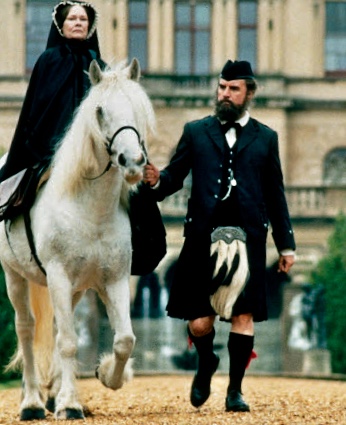 A bodyguard was just what Queen Victoria was in need of, when she decided to eschew the constraints of etiquette, especially in the Scottish Highlands. John Brown fit the bill, but Victoria's children and ministers resented the high regard she had for Brown, after the loss of her husband, Prince Albert. Predictably, rumors that there was something improper in Victoria’s relationship with John Brown, circulated throughout Royal circles . The 15th Earl of Derby, Edward Stanley, noted in his diary, that Brown and Victoria slept in adjoining rooms, “contrary to etiquette and even decency,” while the Queen's own daughters joked that the burly Scotchman was their, “mama's lover.” The Queen dismissed all this chatter as “ill-natured gossip in the higher classes.” — Image above from the 1997 film “Mrs Brown,” a fictionalised story of their friendship. Sir Billy Connolly portrays Brown and Dame Judi Dench portrays Queen Victoria. |
Tall, spare, sharp-featured, with fine blue eyes, and a really good head, with a pleasant demeanor, and very thin legs, he stands serious and attentive behind the chair which he has watched and guarded over for nearly forty five years. Mr. Brown is credited with great personal bravery. On three occasions when Her Majesty’s life has been attempted, he has distinguished himself by his well-directed efforts to protect the Queen, and on one occasion, a successful endeavor to hold the would-be assassin. With the household servants Brown is, naturally enough, unpopular. He enjoys the confidence of the Queen, and rules the household with a rod of iron, so far as he may. He is an authority on Court etiquette, a linguist, speaking half a dozen languages fluently, a classical scholar as well, and student of politics.
I have never heard what his origin was beyond the fact that he is Scotch beyond a doubt, and has been in, the service of the Royal family since boyhood. Rumor gives it that the Prince of Wales hates him like poison and declines to meet him except when forced to do so by Royal command. The Queen has always sought to put him forward, but without success, exactly, and there are stories afloat which I advise you not to believe.”— London Correspondent of the Chicago Daily News, April, 1883
Etiquette Enthusiast, Maura J Graber, is the Site Editor for the Etiquipedia© Etiquette Encyclopedia
